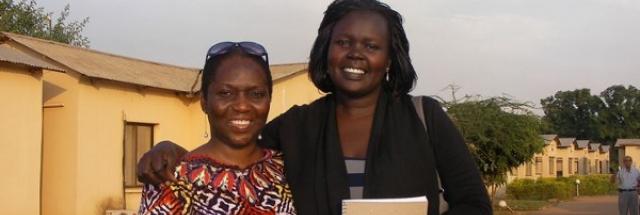Peace and reconciliation mobilisers launch out after month-long training
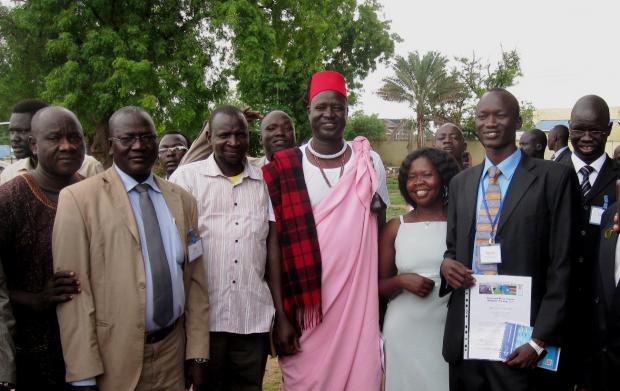
In a first for South Sudan, 200 people, drawn from all 10 states, completed a four-week training to be Peace and Reconciliation Mobilisers throughout the country, on Wednesday 1 May.
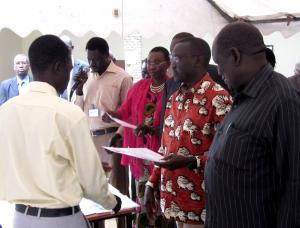 Speaking at the closing ceremony, Emmanuel Lowilla, Minister in the Office of the President, described it as an ‘emotional moment’, bringing with him the greetings of both the President, Salva Kiir Mayardit, and the Vice-President, Dr Riek Machar. He also conveyed the apologies of Archbishop Daniel Deng Bul, new chair of the organising committee, who met with the participants on Monday.
Speaking at the closing ceremony, Emmanuel Lowilla, Minister in the Office of the President, described it as an ‘emotional moment’, bringing with him the greetings of both the President, Salva Kiir Mayardit, and the Vice-President, Dr Riek Machar. He also conveyed the apologies of Archbishop Daniel Deng Bul, new chair of the organising committee, who met with the participants on Monday.
As conflict continues in parts of the country, Lowilla acknowledged the challenge in taking forward the work of reconciliation, encouraging the participants to engage in the process with ‘patience, perseverance and peace.’
The training, delivered by Initiatives of Change (IofC) in partnership with the Government of South Sudan, emphasised the role of personal and relational transformation as the foundation to effective reconciliation initiatives. The content of the process was primarily participant driven and using participatory processes; a surprise for some participants who were expecting a more traditional lecture-oriented approach.
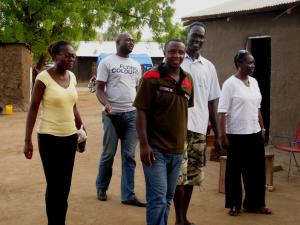 The process began with context setting, where participants themselves constructed a timeline of South Sudan from 1947. From there, a number of sessions were devoted to listening; developing the skills, providing some simple frameworks, and at the same time building the foundations of trust between participants as they shared their individual stories.
The process began with context setting, where participants themselves constructed a timeline of South Sudan from 1947. From there, a number of sessions were devoted to listening; developing the skills, providing some simple frameworks, and at the same time building the foundations of trust between participants as they shared their individual stories.
The remainder of the programme continued along two tracks: deepening the understanding of the qualities that make a peacebuilder and equipping the participants with concrete tools for bringing others into authentic dialogue. Finally, two days of space were devoted to any conversations that the participants themselves felt still needed to happen, before moving into concrete individual and group action plans.
At each step, the process re-iterated the responsibility of each individual. At the closing, Presidential Advisor Tor Deng Mawien, former Chair of the Organising Committee, captured the heart of this process: ‘reconciliation cannot be imposed by law. When the CPA was signed, people had to be part of it. But the bitterness remained. Forgiveness requires an individual response. It is up to me, to you, to forgive.’
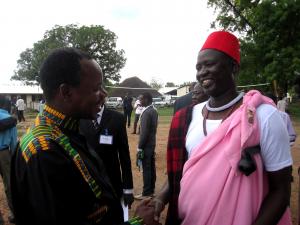 Participants shared their experiences of this personal dynamic of change during the programme. Euphemia Sunday Alphonse, a politician from Eastern Equatoria and mother to Simeon, the programme’s youngest participant (1 year old), described how ‘When I came here I was expecting to be served. But after getting the training I realise that I need also to serve others.’ She continued, ‘The journey of healing I realise is not only national to my own people but I also have to heal my own self and forgive myself in order to go and reconcile my people.’
Participants shared their experiences of this personal dynamic of change during the programme. Euphemia Sunday Alphonse, a politician from Eastern Equatoria and mother to Simeon, the programme’s youngest participant (1 year old), described how ‘When I came here I was expecting to be served. But after getting the training I realise that I need also to serve others.’ She continued, ‘The journey of healing I realise is not only national to my own people but I also have to heal my own self and forgive myself in order to go and reconcile my people.’
Santo Deng Garang, from Western Bahr-el-Ghazal, related how he came to the programme with a deep enmity towards Muslims, but following his encounters with Sheikh Juma Said Ali, overcame his superiority and prejudice. Deng and Said, who spoke together at the graduation, are two members of a new interfaith body set-up by religious leaders taking part in the training. They went as a group to offer their support and services to Archbishop Daniel Deng and the new committee for National Reconciliation.
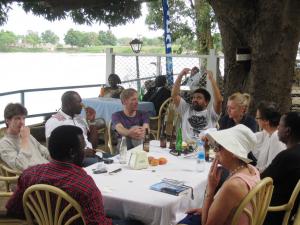 The training faced logistical and financial challenges from the outset, and the scale was questioned by many, including those responsible for designing the programme. Feedback from the participants, however, indicates that the unique diversity of representation in the training was one of its strengths. And with the imprimatur of both the Vice-President and the President, the closing ceremony underlined the inclusive agenda.
The training faced logistical and financial challenges from the outset, and the scale was questioned by many, including those responsible for designing the programme. Feedback from the participants, however, indicates that the unique diversity of representation in the training was one of its strengths. And with the imprimatur of both the Vice-President and the President, the closing ceremony underlined the inclusive agenda.
Participants return to their states to implement individual and group initiatives, and connect with their communities around possibilities moving forward. The mobilisers will be part of the ongoing national programme as the new committee assumes its full responsibilities.
Photos by Mike Brown

